In my 20 years of helping clients with sleep I have observed that the #1 reason people have poor sleep is that they do not see it as a practice that has to be done well and protected as we age.
Why Do We Have Sleep Issues?
If we don't floss and brush our teeth and the dentist tells us we have four cavities we immediately understand why. Somehow with poor sleep, we do not make the connection with our sleep-inhibiting habits such as:
-
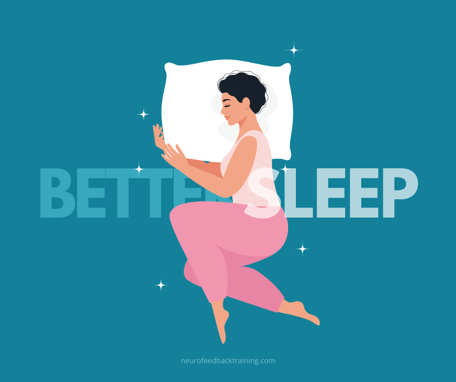
4 PM coffee,
- eating late and drinking alcohol before bed,
- little or no exercise
- watching a heart-pumping drama at night,
- thinking about work or problems as we try to fall asleep.
For those of us who know that they need to make changes, the #2 reason people chronically have poor sleep is that they don't give the new practices to improve sleep enough time and abandon their efforts too soon.
You need three months of a new sleep routine in order for your sleep to change. As example, when our neurofeedback clients with sleep issues rent a systems to help improve sleep, they will say after only a week or two, "I've been on Ambien for 10 years and went off it and now am trying neurofeedback and it's not working." We try to prepare our clients with realistic expectations, in this case three months of neurofeedback combined with better sleep hygiene, but the desire for immediate change is hard to shift.
The expectation of immediate results combined with the belief that we are permanently broken make for people to give up too soon.
Why Should I Care About My Sleep?
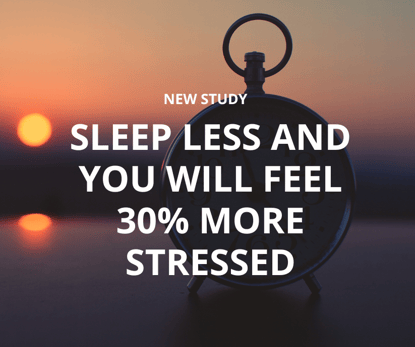
We want you to succeed in having good quality sleep and enough of it because quality health and less illness depends on it! Sleep impacts many of your body's systems: the brain, heart, immune system, to name a few. Long-term research studies shows that those who chronically sleep 5-6 hours have higher rates of degenerative illness in their older years. Insomnia, in particular, has been shown to be most consistently linked with a high risk of depression.
Sleep impacts school and work performance, emotional regulation, and is linked with chronic illnesses such as Type II diabetes, cardiovascular disease, obesity and mood disorders. For example, brain images of those who are sleep deprived show impaired communication between the prefrontal cortex, the brain region responsible for cognitive control, and the amygdala, a big player in emotional responses. This impairment leaves the amygdala hyperactive in those sleep deprived. We wonder why we are more argumentative after a poor night's sleep!
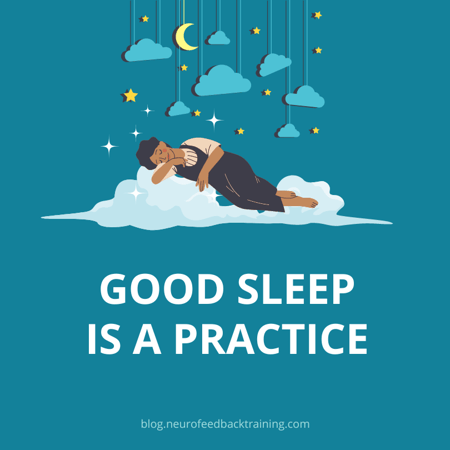 Quality Sleep: It's a Practice!
Quality Sleep: It's a Practice!
For those of you with kids, remember sleep training your children so they would go to bed tired and fall asleep quickly? And having to consciously reassert the discipline at various times in childhood?
Good sleep is a practice. Adjusting to a new routine begins with small steps and consistency. We gradually learn how to do it and repeat that pattern until it's a habit.
With sleep, having a fixed wake-up time, where you wake up at the same time regardless of the day of the week, can help maintain a rhythm as well as allocating half an hour for winding down: getting into a calm state by dimming lights (especially electronics), blocking out noise, and stretching to relax. Every small change to make it easier to sleep helps.
Next Steps for Improved Sleep
What to do to improve your sleep? It depends on your issues. Here are some basic next steps, jump ahead if you already know your issues!
Gather Information
-
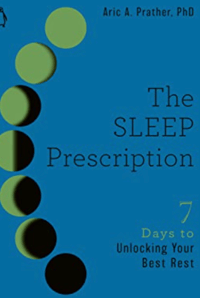 Try this Sleep Diary if you're not sure how much sleep you're getting or how you feel. Fill it out for a week to gather great data to target the issue specific to you.
Try this Sleep Diary if you're not sure how much sleep you're getting or how you feel. Fill it out for a week to gather great data to target the issue specific to you.
-
Read the latest book on sleep, The Sleep Prescription to learn more about the whys and the practical steps for sleeping better.
-
Watch this 20-minute video on TED by sleep scientist Matt Walker, PhD. It has had over 17M views. His talk takes you into the amazing science behind sleep's benefits for the brain, and the surprising negative impacts of too little sleep.
Isolate Your Issues
Is the Issue What You Consume?
- Eating a meal within 2 hours of going to sleep
- Drinking alcohol - learn why
- Watching stimulating television
- Reading stimulating media content or work emails
- Arguing with friends or family members
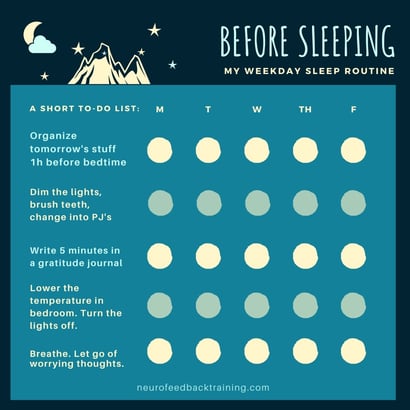
Is the Issue What You Think About?
- Worries about work or school
- The horrible or upsetting news or politics of the day
- Relationships issues
- General problems in life, and not what's going well or inspiring
- "Freak out thoughts" that just serve the purpose of inciting more worrying or strategizing about how to solve problems
Is the Issue How You Feel?
- Worried, anxious or fearful
- Lonely or sad
- Irritable or overstimulated
- Muscle tightness in the shoulders or chest
Create a Plan for Change
Pick your top two issues and create a plan of new behaviors for one month. And don't spend time worrying if it's working.
What You Consume:
- Try to avoid eating at least three hours before bed.
- Try 3 days without drinking, and then if you can, do another 4. After a week of not drinking you may notice how it is impacting your sleep.
- Watch re-runs. Dr. Prather suggests this as a non-stimulating but enjoyable activity to help lower the arousal of the nervous system before bed.
- Don't look at your devices 2 hours before bed. Too much screen time can suppress melatonin production, the hormone that helps to regulate sleep-wake cycles.
What You Think:
- Try having a "Conscious Worry Session", where you sit down and write all your worries and the follow-up to-dos. And then remind yourself when the worry thoughts pop up that they don't get attention until your daily worry sessions.
- Try mindfulness meditation. The practice of labeling your thoughts "thinking" when you notice them, is an excellent practice for training yourself to become aware of those thoughts and redirect your mind. One example of a good meditation to do while laying down is a body scan: focusing on different parts of the body in gradual progression to facilitate relaxation.
- Try associating being in bed with sleep: if after 20 minutes you haven't fallen asleep, try getting up and doing something else before returning to bed, whether reading or stretching for example. Tossing and turning may only facilitate wakefulness and break the mental connection between being in bed and sleep.
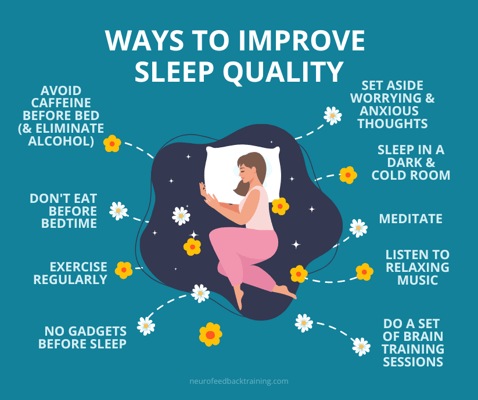
What To Feel:
- If you tend towards worrying or anxiety at night, try listening to the soundtrack: Weightless. Research done on this music, which was created to lower anxiety through the use of tones, showed it lowered anxiety by 65% in participants.
- Try Dr. Huberman's guided state-change practice to Non-Sleep Deep Rest. It is great for learning how to shift states.
- Try other relaxation techniques and tools such as breathing exercises, progressive muscle relaxation and neurofeedback
- Are You Doing NeurOptimal® For Better Sleep?
- Neurofeedback allows the brain to become aware of maladaptive patterns, including those tied to dysregulated sleep schedules, and reset them. Tracking brain activity in real time collected via EEG sensors, neurofeedback software provides precisely timed feedback based on shifts in brain activity. Training over time helps the brain optimize overall mental and emotional resilience. Thus, neurofeedback can help buffer the effects of routines underlying poor sleep and regulate sleep itself whether from exercising insufficiently, eating too close to bedtime or ruminating about a problem at work. Too much stress, whether mental or physical is often at the heart of poor sleep!
- It's also important to keep in mind that neurofeedback has a way of increasing self-awareness of areas already in need of support. When training for sleep, if you're already tired, neurofeedback may exacerbate feelings of exhaustion. Watch this short video where I explain why you can feel "worse" after your first session if you are sleep deprived.
- Neurofeedback training, like learning any new skill tends to be non-linear in progress. Those who have stuck with the training consistently over time have seen great results in sleep management.
- Sleep is central to so many areas of our lives and without it, can leave us feeling unproductive at work, disconnected in our relationships and physically drained. Routines can either lead to chronic sleep issues or facilitate quality sleep schedules. Every small change helps! Good routines, once established, can facilitate a good night's sleep and maintain consistency imperative for our overall health. Better sleep means better quality living!